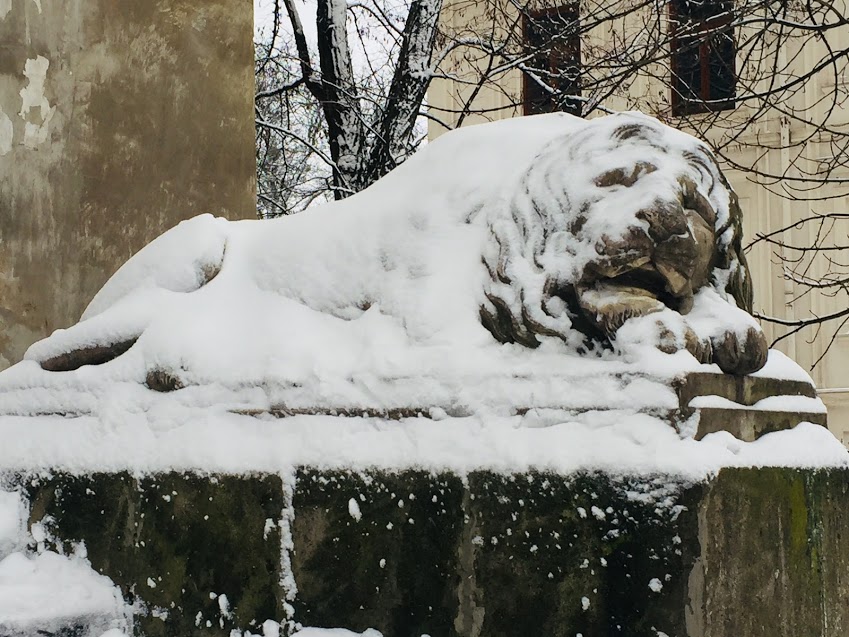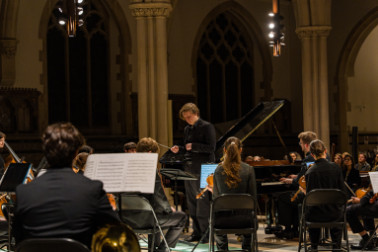Bronze, marble, stone, cast-iron, carved, picturesque, large and miniature, sleepy and awake, formidable and grotesque — this list can be continued indefinitely. It, of course, describes numerous lions statues so widespread in Lviv. Some of them even beat the Guinness World records, which we will talk about later. For now, let's have a look at the history of this incredible phenomenon.
History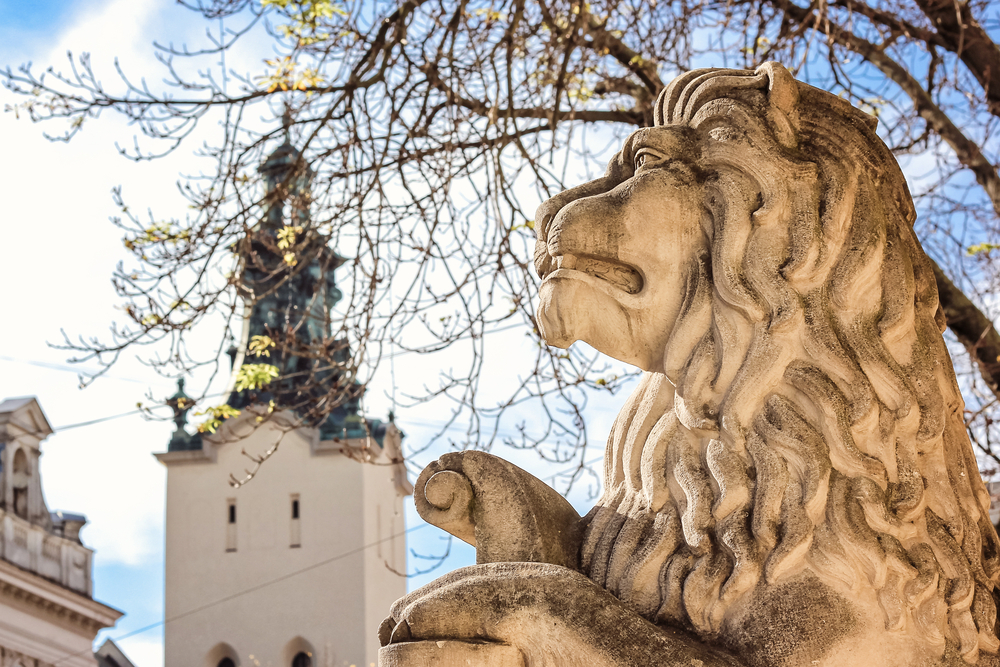
The first image of a lion in Lviv is found on the seal of Galician-Volyn princes Andrew II and Leo II, who called themselves Rulers of Rus, Galich and Volodymyr. It is assumed that lion was a sign of the Romanovych dynasty, but from the first half of the 14-th century, lion is definitely recognized as the territorial emblem of the Galician-Volyn state, the administrative center of which was Lviv.
The oldest known city seal is attached to the parchment letter of the Lviv Magistrate in 1359. It depicts a lion walking into an opened city gate with three gear towers and loopholes. The image carries symbolism of the city's name (identical with the name of the founder's son, Leo I Danylovich) and the old emblem of the principality. In 1526, Polish King Sigismund II Augustus formally approved this coat of arms. Hence started the long history of Lviv's lions that continues to this day.
Read: Places to Visit around Lviv
Besides, some people refer to legends regarding lions' appearance in the city. One of them says that the lion who lived in the woods near the newly established city of Lviv gave an oath to protect not only the forest he ruled, but the city dwellers he kept peace with. One day, he defended the princess Constance from evil charms of the Black Knight, and was hit by a poisoned arrow. When the lion was dying, he swore to keep to his oath of protecting the city and its dwellers even in the afterlife. After the arrow was taken out of his body, amazed citizens saw a statue of a lion right in front of them. The sculpture of a lion sitting on its hind legs and holding the front shield with the emblem of the city became the symbol of Lviv and it remains to this day.
Curious Facts
No matter the origin, lions in Lviv have started to appear since the 14-th century and never stopped. Even nowadays, Lviv's dwellers, businessman and institutions install numerous lion sculptures making it difficult to count them all. According to different estimates, the city hosts from three to four thousand statues. Lviv lions can boast of an unprecedented variety of sizes: from the largest stone four-meter guard lion, installed at the entrance to the city, to the smallest bronze and cast-iron lions on the door handles and fountains. Let's take a look at the record-breaking ones:
The highest located lion is 415 m above sea level — weathervane on the site of the High Castle.
The largest lion is almost 4 meters tall, located near the Sykhiv cemetery.
The house with the largest number of lions — 99 images — is located on 11, Svobody avenue. As for the streets, Svobody Ave. counts 211 images, Horodotska street — 165, and Stepana Bandery — 154 including interiors.
The oldest coat of arms of Lviv (1633) is located on 13, Serbska street.
Finally, the oldest sculpture of the Lviv lion, Lorentsovych Lion, dates back to the end of the 13-th — early 14-th century.
Read: New Tourist Routes in Lviv 2018
Best Lviv Lions Spots
Now that we explored the history of the city's phenomenon, let's see where one can spot the most well-known statues.
City Benches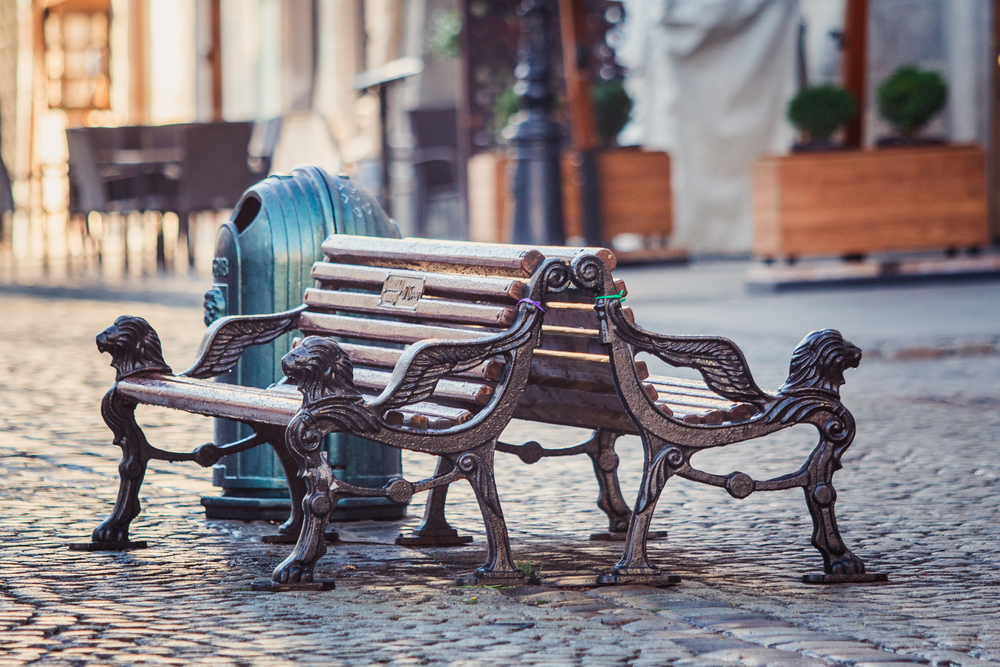
Probably the most common appearance of Lviv's lions, 150 colorful benches made of natural wood with handles in the form of lion's heads paired with an empty beer glass was presented to the city by Lviv Brewery. Curiously, the empty glasses give an opportunity to stuff something inside — some leave an already-read newspaper or magazine, and lovers hide romantic notes meant for each other.
Lviv Town Hall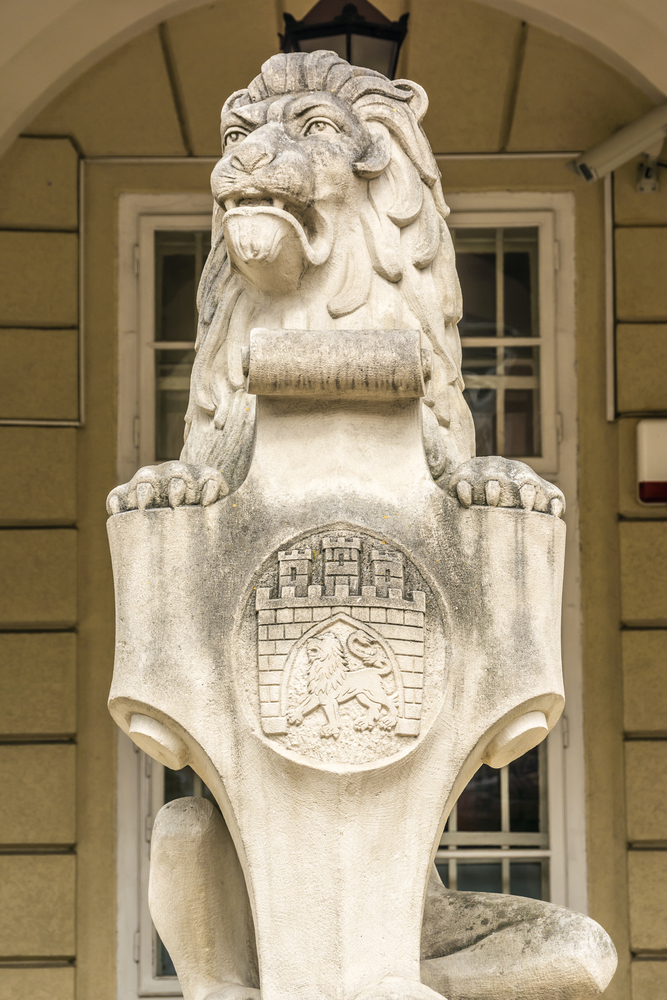
The legend says that sculptures of stone lions, installed at the entrance to the Town Hall, host the souls of respected townspeople who protect honest residents with symbolic heraldic shield they hold firmly with forepaws. In fact, the stone lions of the Town Hall became a symbol of the city long ago. In 1880, in honor of emperor Franz Joseph's I visit to Lviv, the Town Hall was decorated with a portico containing allegorical figures of Hospitality, Courage and Patriotism, made by Leonard Marconi, as well as stone lions, made by Tadey Baronch, which were placed by the both sides of the gate. These lions have known numerous redecoration during the 20-th century, but are still there guarding Lviv and its dwellers.
Address: 1, Ploscha Rynok
Venetian Winged Lion
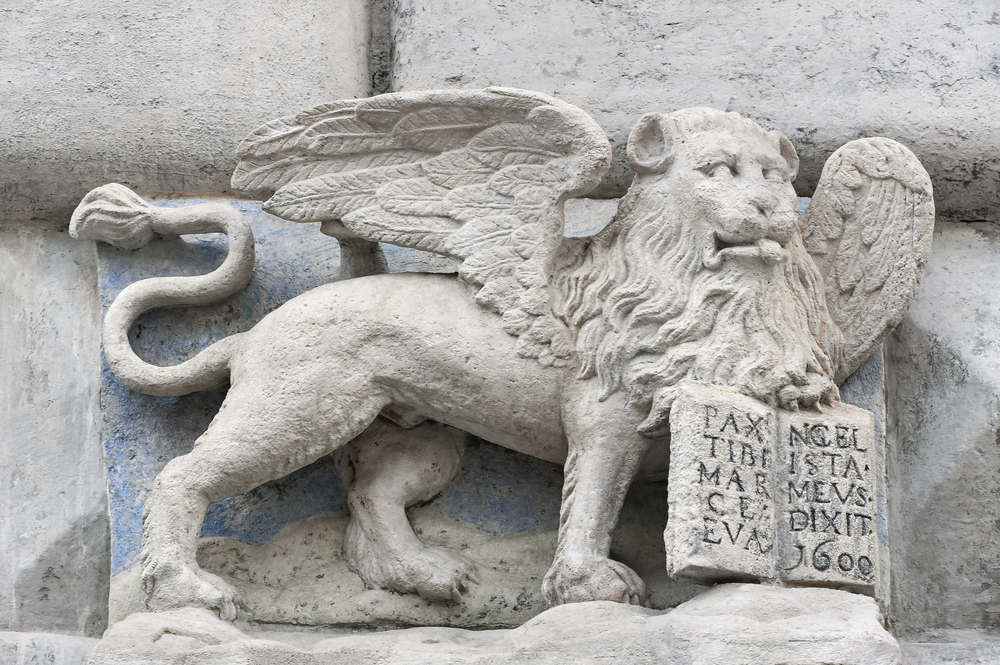
This lion is located on the Venetian House, also dubbed as Massari House. The house was built by architect Pavlo Shchaslyvyi in 1589 upon the request of the Venice Consul and merchant Antonio Massari. The history of this house is secured by a winged lion above the entrance portal — the coat of arms of Venice.
Address: 14, Ploscha Rynok
Lions on the House with Aphorisms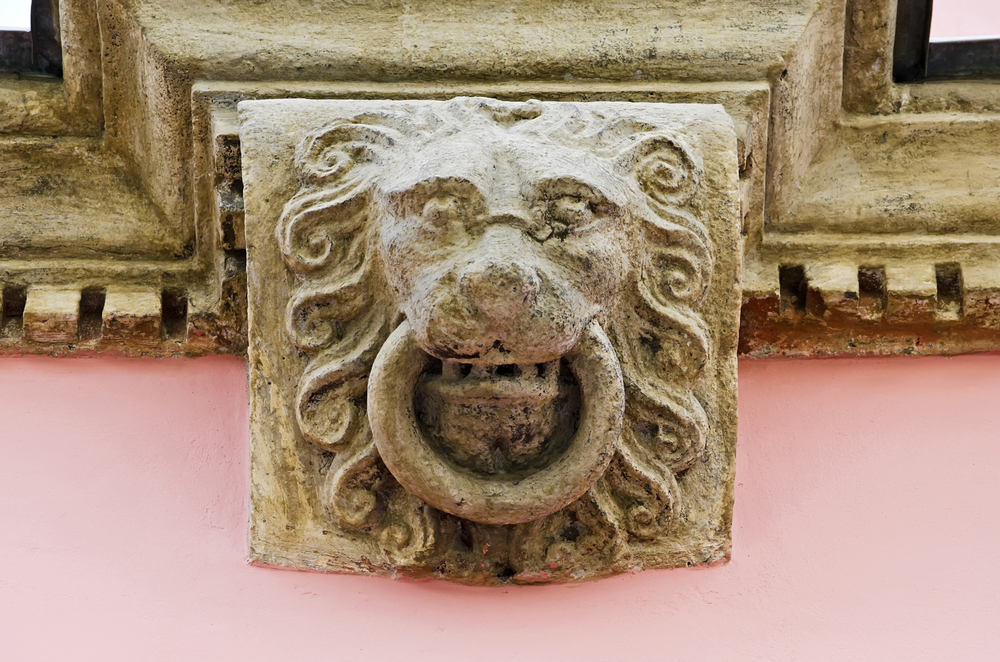
This is one of the best monuments of Lviv's Renaissance residential architecture and one of the most famous Lviv Lions location. The building was erected by Doctor of Medicine Pavlo Dominic Heppner, who settled in the premises in 1610. Since then, the house was named Heppner's, Doctor's and Dominic's or simply "Aphorisms' house". The whole building over the windows is peppered with Latin proverbs, for instance, quotes from works of a Roman poet Ausonius: "Nunquam discrepat utile a decoro" — "Never is the good dissonant with the beautiful".
Address: 28, Ploscha Rynok
Strict lions of the Mazanczowski House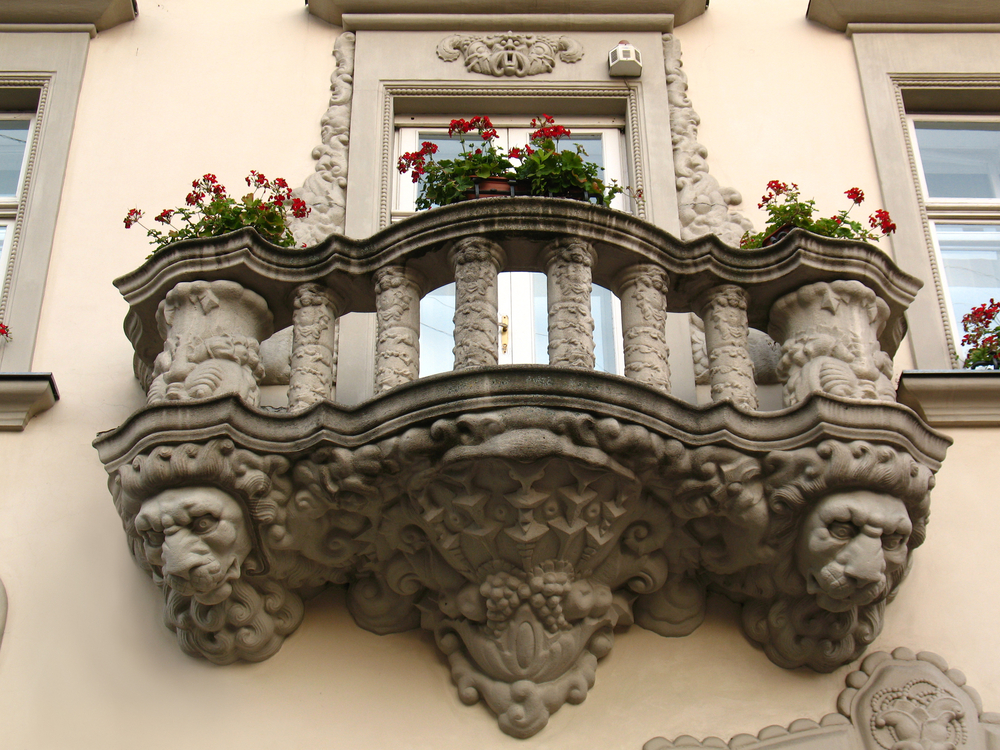
Built in the 16-th century, at the end of the 19-th century this house became property of Bachevsky family - the largest horilka producers in Lviv. The house catches the eye because of its unusual look, acquired after the restoration of 1923, carried out by architect Bronislav Victor and sculptor Zygmund Kurchynskyi in the Modern style. Lions are watching passers-by on Rynok Square from under the balcony with a stern look.
Address: 31, Ploscha Rynok
Read: Best Murals in Lviv
Guards of the Porokhova Vezha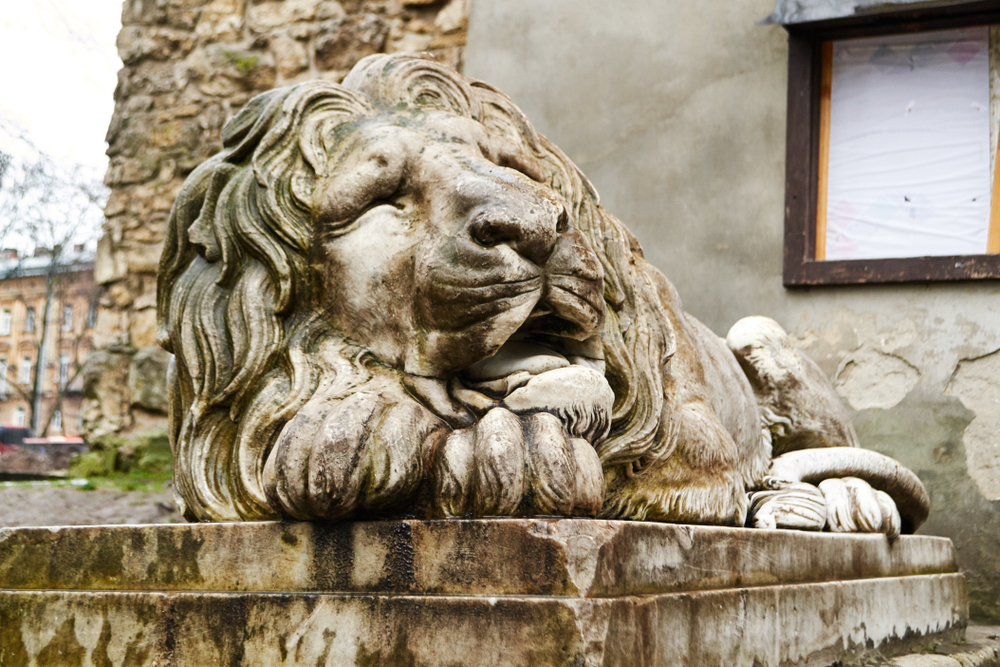
Porokhova Vezha ("Gunpowder Tower") is the only one of the dozens defensive towers, gates and bays standing to this day. It was built from the stones of the old Municipal Arsenal and was considered the most powerful tower to guard the city from the invaders from the East. Besides, Porokhova Vezha served not only for the defense of the city. As Lviv was a trade center, in the absence of a hostile threat, the tower was used as a grain storage. Entrance to the tower is guarded by two lions made of the 19-th century white marble, which carry the greatest artistic value among the stone lions in Lviv.
Address: 4, Pidvalna street
Lychakiv Cemetery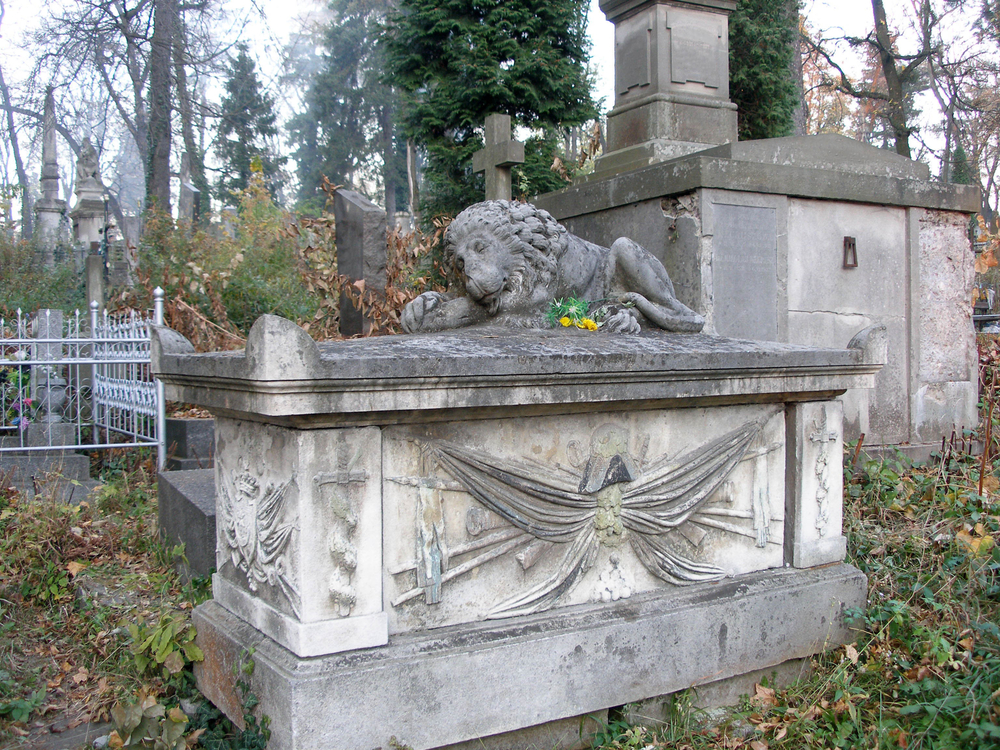
Lions also protect those who are laid to rest and possibly meet the founders of city. Thus, lion statues are not an uncommon sight on tombstones of the Lychakiv cemetery historical and memorial complex in Lviv. Various notable persona, like opera singer Solomiya Krushelnytska, artist Artur Grottger, poet and writer Ivan Franko, and many other worthy people have found their peace here. The creations of sculptors and architects Tadey Baronch, Hartman Witwer, Leandro Marconi and Parys Filippi crown the tombstones and crypts of representatives of noble Austrian, Polish and Ukrainian families. Lychakiv cemetery is not a simple cemetery, but a museum-preserve, where thousands of sculptures not only preserve the memory of past generations, but also are genuine examples of high art.
Address: 33, Mechnykova street
Lions surround every tourist who comes to Lviv — all you need is to look closely and get your camera ready.
Photo source: shutterstock.com. All images belong to their rightful authors.
In Search of Lviv Lions: How to Find Them
Placed on pedestals, bas-reliefs, balconies, front and back entrances, door handles and even weathervane, countless lions are gazing on the passers-by of Lviv. It is no wonder that Lviv is often called the City of Lions — it is safe to say that no matter where you go, silent and graceful guards will find a way to catch your eye. So, where exactly do you need to go? Destinations picked the most famous and lesser known locations for those who search for the Lviv lions.
